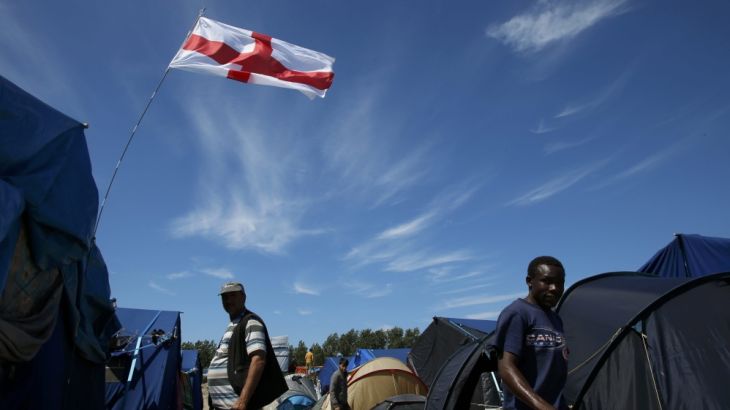Calais refugees: We won’t give up despite Brexit
Residents of “Jungle” camp in France say they are worried after vote to leave EU but their plans have not changed.

Only 23 miles of sea – and several UK border control officers – keep Alaa Ahmad from finishing his journey and ending a nine-month stay at the “Jungle” refugee camp in the French city of Calais.
The Syrian refugee is one of three residents of the camp Al Jazeera spoke to who said that Britain’s vote to leave the European Union added another layer of uncertainty to their already precarious situation.
Keep reading
list of 4 itemsWhy are British farmers pleading for a universal basic income?
Northern Ireland agreement could end deadlock, restore government
Forced to become British: How Brexit created a new European diaspora
Ahmad, like many in the camp who were following the campaign, was taken aback by last week’s referendum result and said that he feared anti-immigration policies could be introduced in its wake.
The UK and France have an agreement in which British border checks can take place on French soil and French checks on British territory.
French Interior Minister Bernard Cazeneuve has said that there will be no change to the existing status-quo despite the Brexit vote, but local officials in the Calais region want the agreements renegotiated.
If there are changes and British border officers are sent back to England, refugees in Calais could be able to travel to English territory unimpeded and face border controls there.
“At first I thought the result would be against separating from the EU … this isn’t good for the British people, there’ll be fewer jobs and the economy will weaken,” he said.
Brexit rhetoric and the consequences of ‘Project Fear’
“After the result I’ve been worrying more about the future … a lot of people here are thinking about what their situation will be like if they reach Britain and there’s a lot of concern about whether asylum laws will change.”
The “Leave” campaign has been criticised for stoking anti-immigration sentiment and the United Nations has condemned a surge in racist incidents since the vote. One survey of voter motivations found that 80 percent of those who voted to leave the EU believed immigration was a force for ill.
Before the vote, the leader of the anti-immigration UK Independence Party, Nigel Farage, unveiled a campaign poster showing a trail of hundreds of refugees in Europe with the caption ‘Breaking Point’.
![UKIP's Nigel Farage has campaigned on a platform of reducing immigration from the EU [Reuters]](/wp-content/uploads/2016/06/f7930d26a43c4dc384412551c6739de1_18.jpeg)
Ammar, a Syrian resident of the Calais camp, said that he was anxious about how things would unfold.
“Refugees are scared about [Brexit] and don’t know where the situation is going … maybe they’ll change the laws against us,” he said.
“We don’t know what’s going to happen in one or two years, and now the extreme-right parties are growing and that’s worrying us.”
Brexit: UKIP’s ‘unethical’ anti-immigration poster
Activists put the number of refugees living in the “Jungle” at more than 3,000, with thousands more living in other camps across northern France.
The refugees Al Jazeera spoke to said that they were aware of others in the camp who were reconsidering their plans to move to Britain, but many still felt compelled to come and believed that the UK had a duty to help.
Mohamed, another Syrian refugee in Calais, said the decision by British voters was a “big joke” and confirmed his perception that Syrian refugees were “not welcome in any country”.
“The people who voted out and are against immigration should know a lot of their tax money is used for striking countries like Syria … a lot of the reasons people come to their country is [due to] its politics,” he said.
All three refugees agreed that they had invested too much to change their plans.
Ahmad hopes to join relatives in England and eventually fulfil his dream of studying biological engineering.
“I’ve spent nine months here, and lost so much time here and money and I have family there so I can’t give up.”
|
|